WMG News
WMG’s BSc Cyber Security receives full certification from the National Cyber Security Centre
WMG’s Cyber Security undergraduate degree has received recognition for its cutting-edge education after receiving full certification from the UK Government’s National Cyber Security Centre (NCSC).
Government’s National Cyber Security Centre (NCSC).
The BSc Cyber Security at the University of Warwick offers a strong foundation in cyber security principles and practical skills, allowing graduates to make meaningful contributions in organisations by safeguarding sensitive information and defending against cyberattacks.
The course is one of only nine fully-certified undergraduate degrees recognised by the NCSC. This certification can help prospective students to make better informed choices when looking for a cyber security course. Employers will also recognise the degree and will benefit from recruiting employees who have had an opportunity to develop their skills in cyber security through a course which has high-quality teaching.
The BSc Cyber Security is the third programme at WMG to gain similar national recognition; both the MSc Cyber Security Engineering and the MSc Cyber Security Management are fully certified by the NCSC.
The University is also recognised by the NCSC as an Academic Centre of Excellence in Cyber Security Education (ACE-CSE) and an Academic Centre of Excellence in Cyber Security Research (ACE-CSR). This level of recognition demonstrates Warwick’s broader commitment to excellence in cyber security education and research, both nationally and in local communities.
Dr Harjinder Lallie, Associate Professor at WMG said: “Being one of only two institutions in the UK with five NCSC certifications underlines the commitment to a world-class cyber security curriculum and associated research programme.
“The upgrade from provisional to full certification has highlighted the effort and commitment the cyber security team have made to the education we offer and helps provide confidence to incoming students as well as employers about our commitment to quality.”
NCSC Deputy Director for Cyber Growth, Chris Ensor said: “The certification of the University of Warwick’s BSc Cyber Security degree by the NCSC demonstrates our shared commitment to responsibly developing the cyber security talent pipeline.
“Offering an NCSC-certified degree helps prospective students make better informed choices about the quality of courses available, and employers can be assured that graduates will be well-taught and have valued industry skills.”
Find out more about the BSc Cyber Security undergraduate degree here: www.warwick.ac.uk/fac/sci/wmg/education/undergraduate/cyber
WMG with Solihull Council secure £300,000 for self-driving shuttle feasibility study
WMG at The University of Warwick, Solihull Council, National Highways, Transport for West Midlands, ZF, Aurrigo, Syselek and Liftango have successfully secured £300,000 to deliver a project looking into the feasibility of a self-driving shuttle service in the West Midlands.
The project will explore how a new automated transport link between Blythe Valley Business Park, near Shirley, and the new HS2 rail station in Solihull could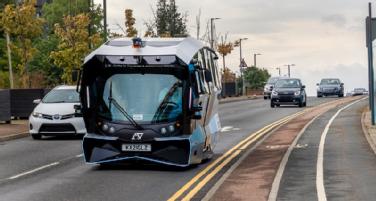 operate in the future. The feasibility study will consider all aspects of the technology required in order to provide a safe and reliable automated public transport service between these important commercial centres. The proposed route would use the existing road network travelling along the M42 from Junction 4 and utilise the new Junction 5a currently under construction.
operate in the future. The feasibility study will consider all aspects of the technology required in order to provide a safe and reliable automated public transport service between these important commercial centres. The proposed route would use the existing road network travelling along the M42 from Junction 4 and utilise the new Junction 5a currently under construction.
As a world-class research institution with leading capabilities in the verification and validation of safety assurance of self-driving technologies, WMG will apply its Operational Design Domain (ODD) based Safety Assurance research methodologies to the specific project challenges.
This project is part of the wider Midlands Future Mobility (MFM) initiative, led by WMG. The MFM vision is to achieve zero road incidents, net-zero emissions and inclusive transport in the West Midlands. MFM enables stakeholders from across mobility to address the interlinked challenges of technology, policy, and behaviour to realise the vision.
Cllr Ken Hawkins, Solihull Council Cabinet Member for Environment & Infrastructure, said: “Connected Automated Vehicle (CAV) technology has the potential revolutionise the way we get around our towns, cities and rural areas. Working with our partners we are excited to be undertaking this latest project.
“We’ve already carried out a series of successful pathfinder trials here in Solihull, using our own automated shuttle, and have led the way in showing how it is possible to practically and safely incorporate automated vehicles into our existing transport infrastructure. We are now taking the next step and undertaking the vital feasibility work necessary in order to start thinking about more ambitious deployments and establishing new commercial public transport services.
“The outcomes from the study are likely to inform self-driving mobility challenges not just here in Solihull but nationwide.”
Jonathan Smith, Midlands Future Mobility Programme Manager said: "The business case for scaling new mobility solutions is complex. It involves a granular understanding of the use case, safety, users, operations, and infrastructure. This project brings together a group of diverse experts to apply state of the art research and knowledge to address this question. Of critical importance is that the outcomes of this feasibility will inform mobility business cases both in the Midlands and the UK as a whole."
More information about this project
Partners: Solihull Metropolitan Borough Council (Lead), Aurrigo, Syselek (Uk) Ltd, Liftango Ltd, ZF Services UK Limited, West Midlands Combined Authority, Highways England, University of Warwick
Grant awarded: £300,000 (£197,664 from Centre for Connected and Autonomous Vehicles’ Commercialising Connected and Automated Mobility programme and balance is made up by the commercial partners).
Find out more about WMG’s Validation and Verification research here: Verification and Validation (warwick.ac.uk)
Note to editors
Media contact:
Annie Slinn
Communications Officer (Sciences)
Gabbie Lau
WMG Marketing and Communications Executive
WMG joins flagship electrification partnership
WMG at the University of Warwick, is part of a unique six-way partner collaborative research and development project led by Aston Martin.
Project ELEVATION has received £9m funding from the Advanced Propulsion Centre UK (APC) to supplement the research and development of Aston Martin’s in-house bespoke luxury battery electric vehicle platform.
Awarded following a competitive process, the government grant will support the development of Aston Martin’s luxury BEV platform and enable a route to net-zero, including investment in vehicle light weighting, a digital toolchain and electrification training.
Project ELEVATION is led by Aston Martin, and supported by the Manufacturing Technology Centre; Expert Tooling & Automation; Creative Composites; Fuzzy Logic Studio and WMG. The project will address the technical challenges of developing a lightweight, 800V traction battery pack and twin front electric drive unit (EDU) into a modular BEV platform with a bandwidth from supercar to SUV.
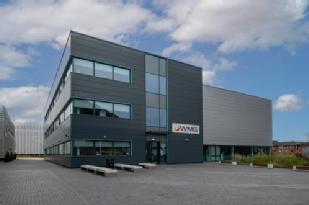 WMG’s role will focus on supporting the design, manufacture and life-cycle analysis (LCA) of the modular structural composite battery enclosure. Researchers in the composites group based in WMG's Materials Engineering Centre (MEC) will conduct materials evaluation and investigate automated high-volume composite manufacturing of hybrid structures using existing tooling and equipment to demonstrate attributes on early learning components. This knowledge will then be transferred to Creative Composites for manufacture of the project demonstrator components and provide LCA of the composite structure into the Manufacturing Technology Centre's holistic LCA model.
WMG’s role will focus on supporting the design, manufacture and life-cycle analysis (LCA) of the modular structural composite battery enclosure. Researchers in the composites group based in WMG's Materials Engineering Centre (MEC) will conduct materials evaluation and investigate automated high-volume composite manufacturing of hybrid structures using existing tooling and equipment to demonstrate attributes on early learning components. This knowledge will then be transferred to Creative Composites for manufacture of the project demonstrator components and provide LCA of the composite structure into the Manufacturing Technology Centre's holistic LCA model.
Roberto Fedeli, Group Chief Technology Officer of Aston Martin, said: “The award of funding from the APC is another major boost to our electrification strategy and constant strive for innovation. Providing further resources to explore the possibilities of our bespoke BEV platform, it will help achieve our ambition to be an in-house BEV technology leader in the ultra-luxury, high-performance segment. We look forward to progressing this project with our collaborative partners and thank the APC for their incredible support.”
Ian Constance, APC Chief Executive, said: “The 23rd round of our collaborative R&D competition coincides with the APC’s 10th anniversary. We’ve seen over £1.4 billion of investment into automotive projects since the APC was set up, and I am proud of the impact that we have made here in the UK. This latest announcement includes a diverse set of OEMs and suppliers that demonstrate the strength of UK automotive. They will further add to our portfolio of innovative projects and continue to drive the UK to deliver on its net zero ambition.”
Find out more about WMG’s composite light-weighting research here https://warwick.ac.uk/fac/sci/wmg/research/materials/acrc
WMG alumnus appointed Honorary Fellow at the University of Warwick
WMG at the University of Warwick’s MSc Engineering Business Management alumnus, Kanishka Arumugam, has been appointed as an Honorary Fellow at the University’s Institute for Global Sustainable Development (IGSD).
Kanishka Arumugam is Co-CEO of EKKI Water Technologies, his family’s business, based in Coimbatore, India. The company efficiently and sustainably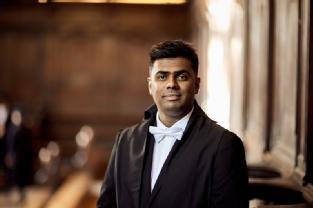 pumps and transports water for agriculture, building services, and utilities, exporting its products to more than 20 countries.
pumps and transports water for agriculture, building services, and utilities, exporting its products to more than 20 countries.
As part of his commitment to sustainable innovation, he is the driving force behind the first wastewater joint venture in collaboration with HOMA, a renowned global wastewater technology company.
Kanishka Arumugam also holds the distinction of being the youngest National Next-Gen President at the CII Family Business Network. He also serves as a Trustee in his family's educational institutions and actively engages in various advisory roles for international start-ups and institutions.
In his role as an Honorary Fellow, he will share his unique insights on how businesses can be a force for good; promote sustainability in the water industry; and support students in gaining a broader understanding of entrepreneurship and sustainable global development.
Professor Elena Korosteleva, Director of IGSD at the University of Warwick, commented: “We extend our warmest welcome to Kanishka to our Institute for Global Sustainable Development. We’re excited to have him bring a fresh perspective on sustainable development and bridge the gap between academia and business, particularly through his involvement with water and wastewater industry globally.”
Kanishka Arumugam, CEO of EKKI Water Technologies, added: "I am deeply humbled and honored by the privilege of being appointed as an Honorary Fellow at the University of Warwick, my esteemed alma mater, which ranks among the top 5% in the world.
“At Oxford University, I honed my leadership acumen and gained a deeper comprehension of human interactions, while the University of Warwick provided me with the resources for applied academia and instilled in me a passion for global competitiveness and sustainable development.
“My close interactions with the late Professor Lord Bhattacharyya and Professor Sujit Banerji at WMG have further emphasized, within the context of EKKI, the critical importance of sustainability and global competitiveness.
“Whenever I step onto the Warwick campus, I am inspired by the incredibly bright minds filled with curiosity and ambition. I eagerly anticipate contributing my best in the coming years within this unique learning environment alongside this brilliant faculty and state-of-the-art facilities."
Professor Steve Maggs, Director of Alumni and Industrial Engagement with Education at WMG said :“It’s great to see Kanishka supporting Warwick through the IGSD. Kaniskha’s remarkable achievements and commitment to positive change make him a fantastic ambassador for the University – this is a great example of the importance of maintaining a lifelong relationship with our former students and the positive opportunities those relationships can foster. Congratulations Kanishka!”
Other distinguished Honorary Fellows of the IGSD include esteemed members of the House of Lords, such as Baroness Sheehan and Lord Teverson. The University has a history of recognising accomplished individuals with connections to India, including prominent figures like Mr. Ratan Tata, the former Chairman of the TATA Group, Mr. Venu Srinivasan of TVS Motors, and Sir Ralf Speth, the former CEO of Jaguar Land Rover, all of whom have received Honorary Doctorates and Honorary Fellow titles from the University.
Find out more about the WMG Alumni community here: https://warwick.ac.uk/fac/sci/wmg/education/alumni/
Prime Minister Rishi Sunak visits University of Warwick for Horizon policy announcement
The Prime Minister visited the University of Warwick, on Thursday 7th September, where he announced the UK would re-join the EU’s flagship research scheme, Horizon.
The move means that UK-based researchers and innovators will be able to access funding from the £85 billion programme, in what has been widely hailed as a major boost for the higher education sector.
Rishi Sunak said it was the ‘right deal for the UK’ as he confirmed that the UK would be re-joining Horizon as an associate member.
The Prime Minister chose to make the major policy announcement at Warwick, which has a world-class reputation for science and innovation, and has close ties with research partners across Europe.
During the visit, he was given a tour of the university’s International Manufacturing Centre by Robin Clark, Dean of WMG, and Emma Flynn, the University’s provost.
Earlier, the Prime Minister had held a private conversation with university leaders, Sir David Normington (Chair); Professor Emma Flynn (Provost); Rachel Sandby-Thomas (Registrar), and Dr Chris Twine (Secretary to Council).
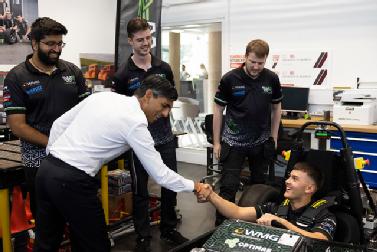 The International Manufacturing Centre – part of WMG - is one of the biggest buildings on campus, and at the heart of the University’s technological research and testing. A variety of projects have been undertaken with global companies to develop new products or improve processes at the centre.
The International Manufacturing Centre – part of WMG - is one of the biggest buildings on campus, and at the heart of the University’s technological research and testing. A variety of projects have been undertaken with global companies to develop new products or improve processes at the centre.
Professor Emma Flynn, the University’s Provost, said: “We were delighted to host the Prime Minister today and welcomed the opportunity to showcase some of the cutting-edge technology and innovation we have here at Warwick.
“The fact the Prime Minister chose to come to Warwick to make such a major announcement on science funding gives me a sense of enormous pride in our brilliant academics and researchers, who have built our reputation as a world-leading university on science, innovation and research over many years.
“The announcement today on Horizon funding is fantastic news for Warwick and the wider university sector and will help drive research excellence and collaboration with our partners.
“This deal will make help us address and make a positive difference to the environmental, economic, and social challenges we all face.”
Sir David Normington, chair of Council and Pro-Chancellor, added: “We were delighted to welcome the Prime Minister to Warwick, and are grateful for his interest in our work at the University. Today’s announcement is great news for everyone. Allowing our scientists to work together, irrespective of borders, is in all of our interests.
“As a former civil servant, I also recognise the hard work of the negotiating team who secured this deal in the background, and they deserve great credit.”
The UK will also associate to Copernicus, the European Earth Observation programme. This will provide the UK’s earth observation sector with access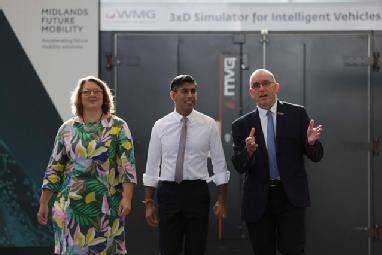 to unique data – valuable to helping with early flood and fire warnings, for example – and with the ability to bid for contracts, which they have not been able to access for three years.
to unique data – valuable to helping with early flood and fire warnings, for example – and with the ability to bid for contracts, which they have not been able to access for three years.
The University of Warwick is ranked as one of the world’s best universities, with 92% of its research rated as world-leading or internationally excellent.
University of Warwick hits the ‘gold standard’ in government teaching rankings
The University of Warwick's teaching has been rated ‘outstanding’ by the UK Government's Teaching Excellence Framework (TEF).
The University achieved the highest possible rating across all three categories for student experience, student outcomes, and for the overall assessment.
Out of 228 universities which took part in the TEF, Warwick was one of 26 to achieve the gold standard across all three. Warwick was one of only four Russell Group universities - including Oxford, Cambridge and Exeter - to achieve this.
It is the latest in a series of top ratings the University has been awarded over recent weeks.
The expert panel concluded that most student experience and student outcomes were of “outstanding quality”, including for students from under-represented backgrounds.
TEF is a national scheme run by the Office for Students (OfS) which aims to encourage higher education providers to deliver excellence in the areas that students care about the most: teaching, learning and achieving positive outcomes from their studies.
The ratings provide students and parents with an independent assessment of the quality of the education delivered by universities within these key areas.
The University has also demonstrated strong progress in closing the attainment gaps for students from disadvantaged backgrounds including those who might have not considered university an option for them in the past. Data from TEF showed better outcomes for students at Warwick from neighbourhoods where less people attend university, and those studying part-time, compared to similar groups of students at other universities.
Commenting on Warwick’s results, Stuart Croft, Warwick’s Vice-Chancellor and President said: “This is an outstanding achievement which recognises the fundamental quality of a Warwick education.
“We’re incredibly proud to have been ranked gold across both the experience students have whilst at Warwick, as well as their outcomes once they have left university.
“These results, which place Warwick as one a handful of institutions to achieve full gold rankings, is a phenomenal achievement for the people responsible – our innovative and remarkable staff and students.”
Professor Gill Cooke, WMG’s Pro Dean (Education) said: “TEF gold standard confirms the commitment and dedication to the student experience from my colleagues in WMG, and it is a delight to have our achievements recognised.”
Warwick was also recently rated as a Top 10 university in the UK by The Guardian, The Daily Mail and The Times. The National Student Survey meanwhile found that 82% of students at Warwick said they would recommend their University to future students.
University of Warwick scientists create virtual marmite for World Marmite Day – with ground-breaking potential for Alzheimer’s diagnosis
Scientists at WMG at the University of Warwick have produced virtual flavours of marmite and vegemite from scratch, using technology that can replicate the flavour of almost any food or drink and is being used in a new taste test to help with early Alzheimer’s diagnosis.
WMG’s Professor of Visualisation, Alan Chalmers has created the virtual flavours for World Marmite Day (28th September) and can, through taking samples of a food and analysing it, accurately simulate a real flavour by extracting its tastes, aromas, and mouthfeel.
The analysis is done by New-Food Innovation, a high-tech food company. Once analysed the virtual flavours are created to accurately match the real flavour using UK Food Standards Agency approved food-safe chemicals.
The analyses/ investigations are all part of Professor Chalmers’ research, together with West Midlands company Superlunary Labs, into how people perceive taste and smell.
He is also investigating whether a poor performance on the new ‘taste test’ that he has developed, may be an early warning signs for diseases including dementia. This could lead to a much earlier diagnosis of diseases such as Alzheimer’s Disease, well before any memory loss starts to occur.
Professor Chalmers describes the flavour making process as the same as using a recipe – by accurately simulating the different components of a flavour, food such as marmite can be replicated with a taste indistinguishable from the real thing.
He commented: “We recreated the health drink rooibos tea and even the chief taster of a rooibos manufacturer in South Africa could not distinguish between the real and virtual rooibos.
“I first thought of creating the samples of marmite and vegemite for a bit of fun during the Ashes cricket tests this summer as people kept asking - what is the difference between them?
“It goes back to the serious work we’re doing which shows that people’s taste and smell can give us clues what’s going on in a person’s brain years before symptoms such as memory loss start”.
Malcolm Barnes from Superlunary Labs added: “We work alongside Professor Chalmers to ensure virtual flavours are delivered from an easy to use, hygienic and highly calibrated device for Chalmers’ team to analyse.’
The full paper on the technology behind this process can be found here.
Read more about WMG’s Visualisation research here: Visualisation (warwick.ac.uk)
WMG welcomes delegation from the Indian Mission on Design and Advanced Technologies to the United Kingdom
On Wednesday (20th September) Professor Robin Clark, Dean of WMG, was pleased to welcome guests from the Indian Mission on Design and Advanced Technologies to the United Kingdom. The visit had been arranged through the Confederation of Indian Industry (CII).
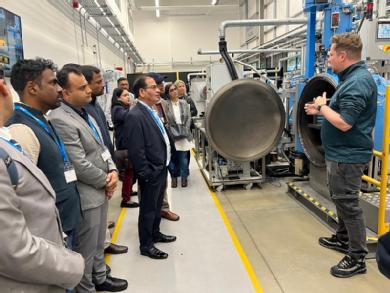 The delegation was made up of representatives from the Department for Business and Trade, and a number of companies including Tata Steel; Dynamatic Technologies Limited; Metrochem Metal Powers; DRDO; Norton Motorcycles; TVS Motor UK; Maruti; Bucket Design; Carborundum Universal Ltd; Two Design; Godrej Consumer Products, Ghaison Bikes plus attendees from IIT Roorkee.
The delegation was made up of representatives from the Department for Business and Trade, and a number of companies including Tata Steel; Dynamatic Technologies Limited; Metrochem Metal Powers; DRDO; Norton Motorcycles; TVS Motor UK; Maruti; Bucket Design; Carborundum Universal Ltd; Two Design; Godrej Consumer Products, Ghaison Bikes plus attendees from IIT Roorkee.
The guests were particularly keen to hear more about WMG’s research and education programmes and partnerships, with a clear focus on skills – including upskilling and reskilling.
Introductions were made from Dr Debashish Bhattacharjee, Vice President, Technology and R&D Tata and Chairman, CII National Task Force on Advanced Materials; and Udayant Malhoutra, CEO and Managing Director Dynamic Technologies Ltd and Chairman, CII National Task Force on Advanced Materials.
Mikhil Gandhi, Business Development Manager for Advanced Manufacturing at the West Midlands Growth Company then explained more about how and why the region has already attracted some of India’s biggest companies; before Professor Robin Clark, Dean of WMG, provided the guests with an insight into WMG’s key strengths, and opportunities for further collaboration.
Finally the guests were shown the Energy Innovation Centre (EIC) the home of WMG’s battery research, before Professor Claire Davis led a tour of the Advanced Steels Research Centre.
Professor Robin Clark, Dean of WMG, explained: “It was a pleasure to welcome representatives from the Indian Mission on Design and Advanced Technologies to the United Kingdom to WMG. Our relationship with India is long standing, and one that we value very highly.”
Read more about the CII’s initiatives here: https://www.cii.in/
The University of Warwick celebrates 200 engineering internships in manufacturing to mark National Manufacturing Day
The University of Warwick is celebrating a new milestone for its engineering internship scheme, with over 200 internships now completed.
The milestone will be celebrated at a special event tomorrow on campus to mark the UK’s National Manufacturing Day – Thursday 28th September.
The internship scheme, which was established by the University’s WMG in 2013, places students in engineering internships at manufacturing businesses across the Midlands.
The scheme has been a hit with both students and businesses, with 75% of businesses experiencing increases in productivity and 95% saying they had noticed a positive cultural change thanks to the interns.
Most businesses who hired one intern through the scheme returned in the future, with around 70 interns now having been offered full time positions as a result of their internships.
The scheme was established to address the skills gap, with businesses needing more engineers than are available. Research suggests this gap is likely to get worse as demand increases, particularly for ‘green’ engineering roles.
Febry Wardhana, an Engineering Project Management postgraduate, recently completed his internship at Midtherm Flue Systems. They were so pleased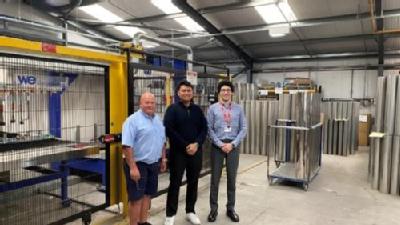 with his work Febry now works for the company permanently.
with his work Febry now works for the company permanently.
Michael Whale, Midtherm’s Training and Development Manager said: “Febry’s work has opened up a lot of new doors for us and he has done a great job, so much so that we offered him a full-time position as a process engineer.”
Other interns have gone into a range of high-profile roles in both small and large organisations. Warwick graduate Sam Woodcock who undertook an internship at Pashley Cycles is now working at Arup as a mechanical engineer. He said:
“My internship with WMG and Pashley helped me to become comfortable in not knowing the answer to every problem I faced, and therefore taught me how to persevere and overcome engineering challenges.”
Dr Mark Swift, Director of SME Engagement at WMG commented:
“Our internship programme is hugely important for us. It has supported over 200 manufacturers while tackling a range of important projects in their businesses and proves that young engineers can add real value. It is critical that we kick start the careers of our future engineers so that they can get onboard to deal with the manufacturing challenges of both today and tomorrow.”
Self-driving cars will be part of the future – but researchers fear we are leaving the disabled behind
 Self-driving cars will be part of the future, but researchers fear people with disabilities are being left behind in the development of the technology.
Self-driving cars will be part of the future, but researchers fear people with disabilities are being left behind in the development of the technology.
Over the past two decades, transportation has become more accessible, but people with disabilities still face significant barriers to accessing these services. While self-driving cars (also known as autonomous vehicles) have the potential to dramatically improve the lives of those with disabilities, helping them to travel independently, experts fear their views are being neglected in the development of the new technology
To address this, researchers from WMG at The University of Warwick and leading disability charities have considered the impact of self-driving taxis on people with disabilities, an area that has seen limited improvement over recent years.
They found that the absence of a driver was strongly correlated with feelings and perceptions of increased travel freedom, indicating that autonomous taxis could provide greater accessibility for those with disabilities – without the limitations or biases associated with their current experiences with traditional taxis and drivers.
The team also considered current issues people who have disabilities face with transport – particularly in booking taxi journeys. Participants expressed concerns about driver attitudes and behaviour as negative experiences with traditional taxis.
Lead author Shravani Sharma, PhD Researcher, WMG, University of Warwick, said: “Our research highlights the current issues those with disabilities face when booking taxis – with many reporting that their trips have been cancelled due to their use of a wheelchair. Drivers might feel the extra time wheelchairs add to journeys would reduce their earnings. While there are laws in place preventing black cab drivers cancelling journeys for those with wheelchairs – there are no such laws for other companies.
“Self-driving taxis could provide those with disabilities more freedom and reduce fear of discrimination. So, it’s crucial we listen to their opinions in developing the technology.
“We worked with charities including CASBA (Citizen Advocacy South Birmingham Area), which supports people with learning difficulties, Royal National Institute of Blind People (RNIB) and Cerebral Palsy Midlands to name a few, providing a wide range of voices and expertise. This represented many different visible and non-visible disabilities – including blindness, mobility problems, hearing loss, cerebral palsy and ADHD amongst others. The perspectives of more than 39,000 different organisation members were included.
“Alongside the current problems those with disabilities face when booking taxis, we highlighted their concerns for future, self-driving taxis. The main concern was the availability of human assistance to meet specific user needs throughout the journey.”
Examples of concerns for future, self-driving taxis:
- The challenges faced by individuals in wheelchairs when attempting to enter a car without assistance are multifaceted. Tasks include placing their wheelchair inside the car, securing themselves within it, disassembling and carefully navigating the wheelchair upon departure.
- For those with visual impairments, the struggle lies in identifying their vehicle within a crowded setting, such as a bustling railway station.
- The loss of social interactions and the light-hearted atmosphere during journeys. Many individuals with disabilities unfortunately contend with feelings of loneliness and isolation, making everyday conversations a vital source of companionship and comfort throughout their journey.
Shravani added: “It is also important that manufacturers consider the wide range of disabilities and the intricate needs for passengers – remembering that not all disabilities are visible.”
Dr Roger Woodman, Head of Human Factors, at the University of Warwick, said: “Self-driving vehicles will open up driving to people that have never been on their own in a vehicle before. It has the potential to transform their lives – with reduced reliance on others to help them get from A to B.
“Driving is a very complex task to complete, so self-driving cars could enable someone with a disability, for example, cerebral palsy or tremors, to simply press a button and go.
Ginny Cullen, CEO of CASBA, added: “CASBA exists to ensure people with learning disabilities speak up for themselves, express their views, make their choices, and are valued as citizens. We were therefore delighted to have had the opportunity to be included in this research on new autonomous vehicles to ensure driving is accessible to all.”
CASE STUDIES – both available for media interviews upon request
Jen Brown
“I have a lot of trouble with the buses. I use a walker and they don’t lower the bus, making it very hard for me to get on and off.
“I had a lot of stress with a taxi company. I often travel from Kingstanding to Northfield. The taxi company didn’t want to take the job and sometimes cancelled, leaving me stressed and late for work. Sometimes I was not able to get home from work.
“I went to a food show in November, when I got to the station the lift was out of order. I walked round the station looking for staff to help, no one and there was no one in the office. I phoned mom and dad see if they could find a number. I had to end up putting my walker on the escalator which was very dangerous.
“I nearly got locked on the train once. I have regular visits to the Severn Valley Railway and am used to the journey. When got to Snow Hill the train stopped, and I thought it was waiting for the signal. People started to get off the train, and I didn’t know why, I decided to get off and just as I did the lights went off and the doors closed. It said on the screen it was cancelled and with my hearing impairment I couldn’t hear the announcement.
Jen added her thoughts on what difference self-driving taxis would make to her life. She said: “When I finish work, I feel very tired and don’t want to talk. I just want to relax on my way home. Also, with my hearing impairment if the windows are open, I can’t hear the driver and just guess as what he is saying. Self-driving taxis would cause me less stress and worry as I wouldn’t have to worry about what the driver is saying to me.”
Michaela Mooney
“I think some people misjudge invisible disability. I may look like I can do things like everyone else but it has a high energy cost for me; my joints hurt and sometimes dislocate so when there's no seats on a bus it can be a struggle. I fall over a lot, sometimes slam doors by accident and when people don't understand what happens it can be hard mentally and physically. I think a self-driving car would mean more independence as you don't have to depend on someone to get around.”
Notes to Editors
Shravani’s research also highlights:
- This is the right time to involve many such organisations that work with people with disabilities to understand user needs via consultations, pilots, and testing.
- Presently, autonomous vehicles and other transport related studies primarily focus on addressing physical disabilities. This emphasis is evident even in signage, consistently featuring wheelchair symbols. However, the breadth of this spectrum encompasses a wide array of conditions. Consequently, it is imperative for brands to acknowledge and cater to these varied requirements and this research can be a basepoint for such engagements.
- This type of research of understanding user-specific needs and requirements will be useful for many such emerging technologies for the equitable rate of adoption to reach the overarching goal of inclusivity and accessibility.
- Future research will also consider more intelligent human machine interaction that can have a social touch to it, for example, personalised conversation nuances, or even adding diverse accents to computer generated voices.

